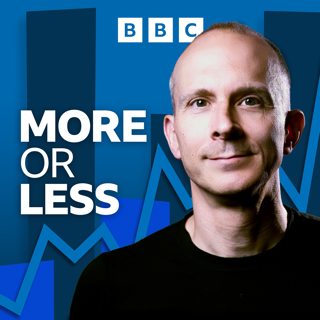
Did Mussolini make the trains run on time?
“Say what you like about Mussolini but he did make the trains run on time.” This phrase is the political equivalent of “every cloud has a silver lining” – but does it have any factual basis? Mussolini’s dictatorship in Italy was full of atrocities, brutal suppression and propaganda. Did it also create a more efficient railway network? We speak to Professor Ruth Ben-Ghiat about the truth of the claim and why the Mussolini regime wanted us to believe it. Presenter: Lizzy McNeill Producer: Lizzy McNeill Researcher: Esme Winterbotham Series Producer: Tom Colls Editor: Richard Vadon Sound Master: James Beard Production Co-ordinator: Katie Morrison.Image: Benito Mussolini in his train studying maps. (Photo by ullstein picture/ullstein picture via Getty Images)
21 Dec 20248min

How many Americans live ‘paycheck to paycheck’?
Are most Americans barely holding their head above water when it comes to personal finances? That’s what various US politicians and news outlets keep suggesting. They can’t stop using a statistic about people living “paycheck to paycheck”. But what does this really mean? We go behind the headlines to unpick the numbers. Contributor: Ben Krauss, journalist Presenter: Charlotte McDonald Producer: Vicky Baker and Lizzy McNeill Series Producer: Tom Colls Production co-ordinator: Katie Morrison Sound Engineer: Andrew Mills Editor: Richard Vadon
14 Dec 20248min

Did one in 10 Greeks die in World War Two?
When World War Two came to Greece, a period of terrible human suffering followed. There was a brutal battle with Italian and then Nazi forces, followed by an occupation in which thousands were executed and a terrible famine swept the nation. There’s an often repeated number that appears to capture the brutality of this time – that 10% of the Greek population died during the war. We investigate where this statistic comes from and whether it is true. Presenter: Charlotte McDonald Producer: Tom Colls Production co-ordinator: Katie Morrison Sound mix: Neil Churchill Editor: Richard Vadon
7 Dec 20249min

Can Elon Musk save the US Government $2 trillion?
President Elect Donald Trump has created a new government advisory group – the Department of Government Efficiency or ‘DOGE’ - to help cut the US budget. The world richest man, Elon Musk, will co-head the department and has pledged to cut ‘at least $2 trillion’ to ‘balance the budget’. But is this possible? We talk to Professor Linda Bilmes about what DOGE could or couldn’t do and how she balanced the budget in the 1990’s. Presenter: Charlotte McDonald Producer: Lizzy McNeill Series producer: Tom Colls Production co-ordinator: Katie Morrison Sound Mix: Andrew Mills Editor: Richard Vadon
30 Nov 20248min

Do fossil fuels get $7 trillion in subsidies?
Governments around the world have promised to fight climate change. But are they also pumping an absolutely massive amount of money into subsidies for fossil fuels? In 2022, an IMF working paper estimated that global subsidies for fossil fuels totalled $7 trillion. But when you dig into that research, you find that this number might not mean what you think it does. We explain how they reached that conclusion, with the help of Angela Picciariello from the International Institute for Sustainable Development, and Nate Vernon, one of the co-authors of the IMF paper.
23 Nov 20248min

Did 20 million votes really go missing in the US election?
Just hours after Donald Trump claimed victory in the US presidential election, rumours started swirling that something was afoot. A graph went viral on social media that appeared to show there were 20 million more votes cast in 2020 than in the 2024 election. Where had these supposedly “missing” votes gone? Conspiracy theorists on both sides of the political spectrum began shouting claims of fraud. The answer, it turns out, is rather more straightforward. Presenter: Charlotte McDonald Producer: Lizzy McNeill Series producer: Tom Colls Production co-ordinator: Katie Morrison Sound Mix: Hal Haines Editor: Richard Vadon
16 Nov 20248min

Do we have enough clothes for the next six generations?
A huge quantity of clothing is produced every year around the world. But is so much made that there are already enough tops, trousers, skirts and all the rest to clothe humanity for decades into the future? That’s a claim that has been percolating around the internet recently, that there are already enough clothes for the next six generations. Tim Harford and Beth Ashmead Latham explore the source of this claim and, with help from Sabina Lawreniuk from Nottingham University, find that the evidence behind it is far from persuasive.Presenter: Tim Harford and Bethan Ashmead Latham Producer: Bethan Ashmead Latham Series producer: Tom Colls Production co-ordinator: Katie Morrison Sound Mix: Annie Gardiner Editor: Richard Vadon
9 Nov 202410min

What can economics learn from sport?
The great theories of economics seem to have great explanatory power, but the actual world is often far too complicated and messy to fully test them out. Professor Ignacio Palacios-Huerta, an economist at the London School of Economics has an answer – sport. In the contained setting of competitive sport, he says, the rules are clear and you know who is doing what. This means, with some analysis, you can see vibrant illustrations of well-known economic theories playing out before your eyes. Ignacio talks to Tim Harford about some of his favourite economic theories, demonstrated in action in sporting competition.Presenter: Tim Harford Producer: Natasha Fernandes Series producer: Tom Colls Production co-ordinator: Katie Morrison Sound mix: John Scott Editor: Richard Vadon
2 Nov 20248min





















